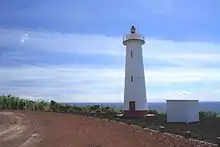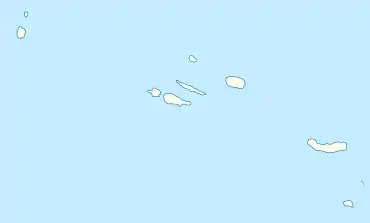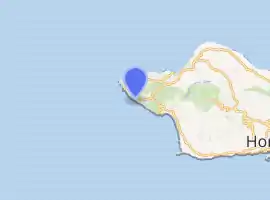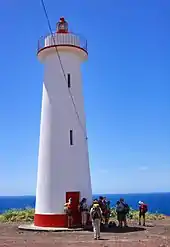Lighthouse of Vale Formoso
The Lighthouse of Vale Formoso (Portuguese: Farol de Vale Formoso) is a beacon/lighthouse located along the southwestern cliffs of the civil parish of Capelo, in the municipality of Horta, on the Portuguese island of Faial, in the archipelago of the Azores.
 The lighthouse on the edge of the cliff with utility building | |
 Azores | |

| |
| Location | |
|---|---|
| Coordinates | 38°34′52.1″N 28°48′40.3″W |
| Construction | concrete tower |
| Tower shape | 14 metres (46 ft) circular |
| Markings / pattern | white tower |
| Tower height | 14 metres (46 ft) |
| Focal height | 114 metres (374 ft) |
| Light source | mains power |
| Range | 12 nmi (22 km) |
| Characteristic | 2 Fl W 10s. |
| Fog signal | No |
| Admiralty number | D2699 |
| NGA number | 23348 |
| ARLHS number | AZO-025[1] |
| Portugal number | PT-868 |
| Managing agent |
|
| Heritage | Unclassified |
History

The lighthouse was constructed to substitute the destroyed lighthouse on the promontory of Capelinhos, following the eruption of the volcano in 1957-1958.[2][3][4]
Architecture
The lighthouse is located along the Capelo peninsula, along the southern coast of the island, approximately 2.5 kilometres (1.6 mi) southeast of the lighthouse of Capelinhos.[2][3][4]
It consists of a truncated white circular tower constructed of reinforced contract with gallery and small red beacon on its top.[2][3][4] Approximately three storeys tall, each registry is marked by a slitted window, culminating in the top platform with guardrail.
References
Notes
- "Vale Formoso", The Lighthouse Directory, Chapel Hill, North Carolina: University of North Carolina, retrieved 20 December 2016
- Ferreira, Teresa (2011), SIPA (ed.), Farol de Vale Formoso (IPA.00032125/PT072002020040) (in Portuguese), Lisbon, Portugal: SIPA – Sistema de Informação para o Património Arquitectónico, archived from the original on 4 October 2013, retrieved 20 December 2016
- Edição Atlantic View (2003), p.69
- Instituto Hidrográfico (2003), p.154
Sources
- Aguilar, J. Teixeira de; Nascimento, J. Carlos; Santandreu, Roberto (1998), Onde a terra acaba, história dos faróis portugueses (in Portuguese), Lisbon, Portugal
- Aguilar, J. Teixeira de, Faróis de Portugal - a terra ao mar se anuncia (in Portuguese), Lisbon, Portugal: Clube do Coleccionador dos Correios
- Vilhena, Francisco João; Louro, Maria Regina (1995), Faróis de Portugal (in Portuguese), Lisbon, Portugal
- Faróis de Portugal (in Portuguese), Lisbon, Portugal: Direcção de Faróis da Marinha Poruguesa, Ciência Viva, 2005
- Lista de faróis, bóias luminosas, radiofaróis, sinais de nevoeiro e sinais horários e de mau tempo, estações radiotelegráficas e de socorros a náufragos, Lisboa (in Portuguese), Lisbon, Portugal: Direcção de Faróis, 1955
- Lista de luzes, bóias, balizas e sinais de nevoeiro (in Portuguese) (8 ed.), Lisbon, Portugal: Instituto Hidrográfico, 2008
- Faial, Açores: Guia do Património Cultural (in Portuguese), Edição Atlantic View – Actividades Turísticas, Lda., 2003, ISBN 972-96057-1-8
- Instituto Hidrográfico, ed. (2003), Ajudas à Navegação: Lista de Luzes, Bóias, Balizas e Sinais de Nevoeiro (in Portuguese), 1 (6 ed.), Lisbon, Portugal: Instituto Hidrográfico, ISBN 972-8486-23-5